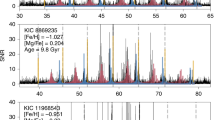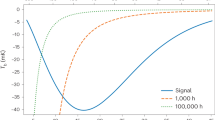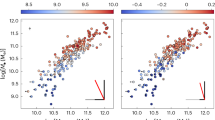Abstract
THE age of the Universe is one of the most interesting cosmological parameters. The fact that the age is finite has intriguing philosophical as well as physical implications. An accurate age when compared to the present expansion rate parameter, the Hubble constant H0, can in the standard big bang model even determine the large scale structure of the Universe, that is decide whether the Universe is open or closed. This note combines the various constraints of the traditional dating methods in the context of the standard cosmological model to see which age can satisfy them all. This simultaneous solution is more restrictive than the previous ranges on the age of the Universe, and agrees with the description of the Universe given by Friedmann.
This is a preview of subscription content, access via your institution
Access options
Subscribe to this journal
Receive 51 print issues and online access
$199.00 per year
only $3.90 per issue
Buy this article
- Purchase on Springer Link
- Instant access to full article PDF
Prices may be subject to local taxes which are calculated during checkout
Similar content being viewed by others
References
Schramm, D. N. A. Rev. Astr. Astrophys. 12, 383 (1974).
Weinberg, S. Gravitation and Cosmology (Wiley, New York, 1972).
Iben, I. A. Rev. Astr. Astrophys. 12, 215 (1974).
Schramm, D. N. & Wasserburg, C. J. Astrophys. J. 162, 57 (1970).
Hainebach, K. L. & Schramm, D. N. Astrophys. J. 212, 347 (1977).
Gott, J. R., Gunn, J. E., Schramm, D. N. & Tinsley, B. M. Astrophys. J. 194, 543 (1974).
Gunn, J. E. Orange Aid preprint 464, Caltech (1976).
Schramm, D. N. & Wagoner, R. V. A. Rev. nucl. Sci. 27, 37 (1977).
Wagoner, R. V., Fowler, W. A. & Hoyle, F. Astrophys. J. 148, 3 (1967).
Gott, J. R. & Turner, E. L. Astrophys. J. 209, 1 (1976).
Gott, J. R. & Turner, E. L. Astrophys. J. 213, 309 (1977).
Dupree, A. K., Baliunas, S. L. & Shipman, H. L. Astrophys. J. 218, 361 (1977).
Epstein, R. I., Lattimer, J. M. & Schramm, D. N. Nature 263, 198 (1976).
Lynden Bell, D. Nature 270, 396 (1977).
Iben, I. & Rood, R. T. Astrophys. J. 159, 605 (1970).
Demarque, P. & McClure, Astrophys. J. 213, 716 (1977).
Kukarkin, B. V. The Globular Star Clusters (Nauka, Moscow, 1974).
Hartwick, F. D. A. & Van den Bergh, D. A. Astrophys. J. 185, 887 (1973).
de Vaucouleurs, G. Nature 266, 126 (1977).
Branch, D. & Patchett, B. Mon. Not. R. astr. Soc. 161, 71 (1973).
Author information
Authors and Affiliations
Rights and permissions
About this article
Cite this article
KAZANAS, D., SCHRAMM, D. & HAINEBACH, K. A consistent age for the Universe. Nature 274, 672–673 (1978). https://doi.org/10.1038/274672a0
Received:
Accepted:
Issue Date:
DOI: https://doi.org/10.1038/274672a0
This article is cited by
-
Neutrinos and the age of the Universe
Nature (1980)
Comments
By submitting a comment you agree to abide by our Terms and Community Guidelines. If you find something abusive or that does not comply with our terms or guidelines please flag it as inappropriate.



